FOCUS ON IMAGE
French journalist and author Régis Genté on how the West views Zelensky, Putin, Saakashvili, and Georgia's ruling team PAGE 5
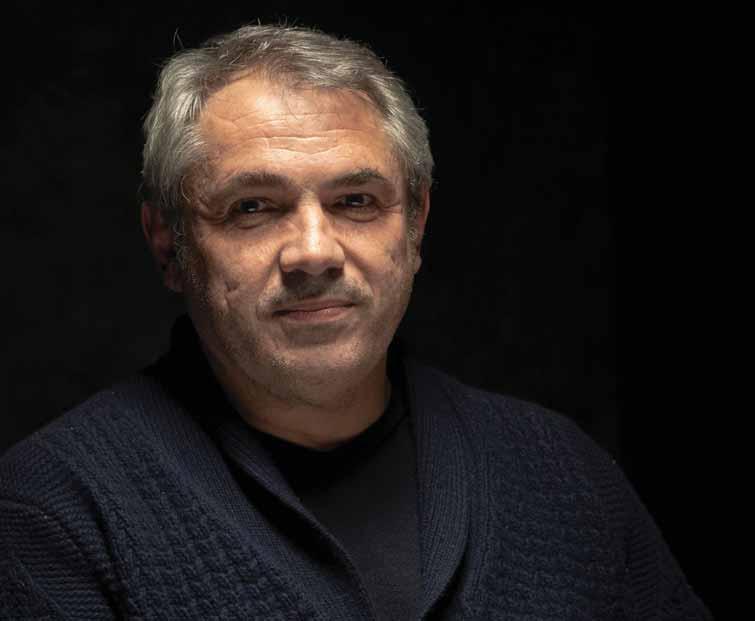
PR for Nature’s Clean-up Crew – Saxon Bosworth’s New Film “Vanishing Sky Lords”
Anew film, made in the Eagle Gorge of Dedoplistkaro, Kakheti, tells the story of two Georgian wildlife conservationists and one group of misunderstood creatures. Vultures have a commonly unknown, yet crucial role in our wild ecosystems: They are “nature’s cleanup crew”, in the words of Director of Vulture Conservation Foundation, José Tavares, who offers commentary in the film.
“Vanishing Sky Lords” (გაუჩინარებული
) explores this role vultures have in nature, their public perception, presence in ancient mythical tales, and dramatic disappearance in recent decades. “Vanishing Sky Lords” follows filmmaker Saxon Bosworth’s recent project, “Like an Animal”, previously reported on in GEORGIA TODAY.
The film follows zoologists Nika Paposhvili and Nika Kerdikoshvili through Eagle Gorge as they carry out fieldwork; gathering information on population size, breeding population, and nesting success of the griffon and Egyptian vultures. This work is essential to understand what the true status of vultures is in Georgia.
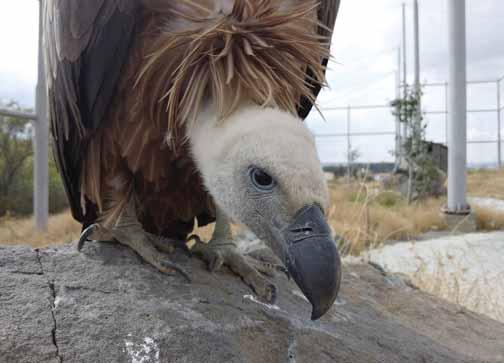
In this week’s issue...
Ukraine Updates: Russia Says ‘Fierce Resistance’ Seen in Bakhmut, Ukrainian Fighters under ‘Insane Pressure’
NEWS PAGE 2
Illegal Globalization is Russia’s Main “Ally” against the West
POLITICS PAGE 4
USAID Agriculture Program Hosts Market Access Facilitating Event

BUSINESS PAGE 6
Engaging CSOs in Designing the National Climate Policy
BUSINESS PAGE 7
The Expat Lifestyle: George Welton, a British "Public Policy Professional," Here to Stay

SOCIETY PAGE 9
Berikoaba – Georgia’s Ancient Fertility Festival Still Going Strong
CULTURE PAGE 11
PreparedforGeorgiaTodayBusinessby
Issue no: 1388 • • MARCH 3 - 9, 2023 • • PUBLISHED WEEKLY
PRICE: GEL 2.50
Continued on page 9
ცის ღმერთები
French journalist and author Régis Genté
Ukraine Updates: Russia Says ‘Fierce Resistance’ Seen in Bakhmut, Ukrainian Fighters under ‘Insane Pressure’
COMPILED BY ANA DUMBADZE
Ukraine President Volodymyr Zelensky signaled Kyiv is preparing its soldiers for counteroffensives and praised them for defending the country despite the “insane pressure” they are currently under as the war grinds on.
“We are preparing for the return of our warriors to actions for the liberation of our land,” the President said in his nightly address Tuesday, alluding to an expected counteroffensive Ukraine is likely to launch in spring.
Ahead of that offensive, Zelensky said Bakhmut, a city in Donetsk in eastern Ukraine that has been wrestled over by Russian and Ukrainian forces for over six months, remains the epicenter of fierce fighting and fatalities in the war.
The commander of Ukraine’s ground forces told Zelensky on Tuesday that 800 Russian soldiers had died in the vicinity of Bakhmut alone since last Thursday.
The Center for Strategic and International Studies think tank estimates that Russia has seen more losses from a year of war in Ukraine than all Russian wars following World War II combined.
The US think tank estimates that about 5,000 to 5,800 Russian military personnel have been killed every month since last February, bringing the total dead to up to 70,000 individuals.
RUSSIAN MERCENARY LEADER SAYS UKRAINE PUTTING UP ‘FIERCE RESISTANCE’ IN BAKHMUT
The head of Russia’s mercenary troops, who have been fighting for months to capture Bakhmut and surrounding settlements, said Wednesday that Ukraine is putting up fierce resistance to Russian efforts to fully encircle and capture the city in Donetsk.
The founder of the Wagner Group, Yevgeny Prigozhin, denied several Russian reports suggesting Ukrainian security forces had received an order to retreat from Bakhmut saying that, on the contrary, Ukraine was throwing everything it could muster to defend Bakhmut, a city that Russia calls “Artemivsk” or “Artemovsk.”
“The Armed Forces of Ukraine in Artemivsk are adding additional reserves and are trying with all their might to keep the city. Tens of thousands of soldiers of the Ukrainian army are putting up fierce resistance, the bloodshed of the battles is increasing every day,” Prigozhin said in a statement reported by Russian news agency Ria Novosti.
Prigozhin’s forces, made up of standard mercenary fighters and men recruited from Russian jails who were offered a reprieve in return for fighting in Ukraine, have been credited with slow, incremental advances by Russian forces in Donetsk in recent weeks.
Unlike some Russian military officials, Prigozhin has not downplayed the abilities of Ukraine’s fighters and he has been openly critical of the Russian defense ministry’s strategies in Ukraine, ruffling feathers back in Moscow.
Russian forces continued to pummel Bakhmut on Wednesday but have not fully surrounded the city, according to Reuters.
The news agency noted Wednesday that it was still able to reach Bakhmut from the west on Monday, saying that was “proof that the city was not yet surrounded despite Russian forces pressing from north and south to close the last remaining routes in.”
According to Reuters, flames and smoke rose into the sky from blazing buildings, and the sounds of gunfire and explosions peppered the air. Ukrainian armored vehicles roared through the streets, it noted, while stray dogs wandered in the mud and destruction wrought on the former industrial city.
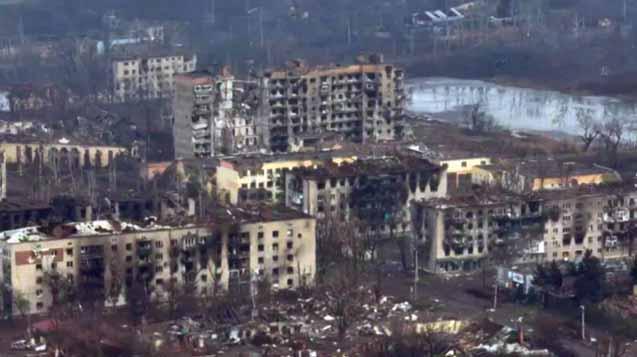
Several thousands of civilians remain in the city despite the relentless fighting around them, which has been going on for more than half a year. Russia has thrown thousands of troops into the fighting around Bakhmut, a city in Donetsk that it is determined to capture in a bid to rupture Ukrainian supply lines in the east.
In an update on Facebook Wednesday morning, the Ukrainian military said Russian forces have “not stopped storming the city of Bakhmut” but said Ukraine’s forces continue to fight back.
RUSSIA ACCUSES UKRAINE OF ATTEMPTING DRONE ATTACK ON CRIMEA
Russia’s Ministry of Defense claimed Wednesday that Ukraine had attempted to carry out what it described as a “massive drone attack on objects of the Crimean peninsula,” but said the attack had been prevented.
“Six Ukrainian attack drones were shot
down by air defense systems. Four more Ukrainian drones were disabled by electronic warfare,” it said, news agency Tass reported, noting there were no casualties from the incident. It did not give details on what was targeted nor did it present evidence.
Ukraine has not yet responded to the claim, which comes a day after Russia accused it of carrying out several drone attacks on Russian territory.
On Wednesday, however, the head of the joint press center at Operational Command South, Natalia Humeniuk, said Russian forces were looking to further fortify defense positions in Crimea, a peninsula Russia annexed in 2014. Humeniuk said on Ukrainian television that Russia had brought in conscripts to dig defenses in a bid to set up a firm line ahead of a potential Ukrainian offensive, news agency Ukrinfornm reported.
“Let them dig, It’s something to keep their hands busy for now,” Humeniuk added.
RUSSIA LOOKING TO STRETCH UKRAINE’S AIR DEFENSES WITH NEW DRONE STRIKES
A series of drone attacks on Ukraine at the start of the week were likely launched by Russia from a new site, giving it more opportunity to strike targets in Kyiv,
Britain’s Ministry of Defense said Wednesday.
Ukraine’s Ministry of Defense said Monday that it had shot down 11 Shahed one-way attack uncrewed aerial vehicles (OWA UAVs) out of 14 that had been launched the previous night.
Serhii Popko, the head of the Kyiv City Military Administration, reported nine of these were shot down in the vicinity of Kyiv airspace.
Britain’s Ministry of Defense noted in its daily intelligence updated that “due to the vector of the attack, these ShahedUAVs were highly likely launched from the Bryansk Oblast, Russia. Previously, the only observed launch site since midDecember 2022 was from the Krasnodar region, across the Sea of Azov.” “A second launch site would give the Russians a different axis of attack, closer to Kyiv. This is likely to decrease time in the air over Ukraine and attempt to further stretch Ukrainian air defenses,” it added.
The defense ministry also noted a brief reprieve from drone attacks that have been used to damage Ukraine’s energy infrastructure and have also hit residential buildings, noting that prior to these latest attacks there had not been any reports of UAVs being used in Ukraine since around February 15.
“This decrease in OWA UAV attack tempo likely indicates that Russia has run down its current stock: It will likely seek a resupply,” it said.
IAEA CHIEF SAYS TEAM AT ZAPORIZHZHIA HEARD 20 EXPLOSIONS NEAR THE NUCLEAR POWER PLANT
International Atomic Energy Agency Director General Rafael Mariano Grossi renewed his concerns about heavy artillery fire near Ukraine’s Zaporizhzhia nuclear power plant.
Grossi said the site, which is Europe’s largest nuclear power plant, temporarily lost power on “its only remaining backup power line.”
He said that IAEA inspectors at the site documented at least 20 detonations on Monday.
He also expressed concerns about the IAEA inspectors at the facility who have not been able to rotate out of working there. He added that the team should have been replaced nearly a month ago.
Welcome to Georgia! The 8th Official Ceremony of the National Tourism Awards
Winner: Tsinandali Manor - Radisson Collection
7. The best standard hotel
Winner: Hotel Hualing Tbilisi
8. The most adventurous national park in Georgia Winner: Okatse Canyon
9. The best travel company Winner: Avianet (Airline)
10. Special prize – Khetsuriani trophy Winner: Levan Songhulashvili
16. The best hotelier Winner: Maya Murachashvili
17. The best restaurateur Winner: Giorgi Shvelidze (Tsitskvili Group)

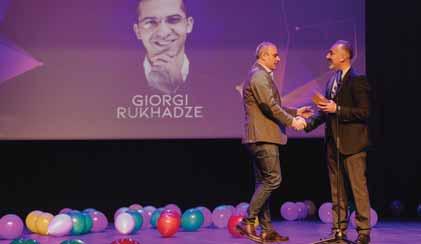
18. The best event organizer Winner: Wedding Georgia
19. The best spa Winner: Sam Raan
20. The best photographer Winner: Paata Vardanashvili
On February 28, Welcome to Georgia’s 8th official ceremony of the National Tourism Awards was held in the new space of Tsiskvili Group - "Theater."
Some 600 guests attended the ceremony, among them representatives of travel agencies, hotels, events and festivals, restaurants and cafes, wine companies, central and local authorities, and government. Also there were traveling photographers and media representatives.
The ceremony was overseen by the independent auditor BDO Georgia, which greatly contributed to the transparency and reliability of the project.
24 winners were announced at the cer-
emony:
1. The best seaside hotel - international chain
Winner: Radisson Blu Batumi
2. The best seaside hotel - local chain
Winner: Tapis Rouge Boutique Batumi.
3. The best 4 season mountain resort
Winner: Hotel Sairme
4. The best 4-season ski resort
Winner: Gudauri Lodge
5. The best budget hotel
Winner: Hotel Ibis Budget
6. The best international chain hotel in Georgia
11. The best entrepreneur in the tourism industry Winner: Edward Mkrtchiani (Edis Dacha)
12. The best winemaker Winner: Giorgi Rukhadze - (George Gray Weiner)
13. Award for the best general manager Winner: Elene Otarashvili - Golden Tulip
14. The best guide Winner: Tamar Iosebashvili (Shumi)
15. Award for personal contribution to the tourism industry Winner: Nana Tabidze (musical festival - Mullet Fest)
21. The best Chef Winner: Guram Baghdoshvili
22. The most interesting tour Winner: Urban Kids Tour
23. Best wine ambassador Winner: Daria Kholodzhilina
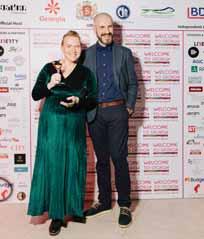
24. The best bar Winner: Golden Tulip - Tita Restaurant
25. The best opening of the year 2022 Winner: Pullman Axis Tower
The ceremony continued with an afterparty.
The awards was held for the eighth year with the support of the Ministry of Economy and Sustainable Development of Georgia - National Tourism Administration, Tbilisi City Hall, and the Agency of Protected Areas of Georgia.
At the ceremony, guests were hosted by the wines of Chateau Mukhrani, Vismino and Shumi.
GEORGIA TODAY MARCH 3 9, 2023 2 NEWS
Political Forum on Gender Equality Highlights the Need for Equal and Inclusive Political Processes in Georgia
Elected officials, public servants and civil society representatives from all over Georgia gathered at the annual Political Forum on Gender Equality inaugurated by President of Georgia Salome Zurabishvili.
Focusing on the political empowerment of women and youth, and greater cooperation between legislative and executive bodies, local self-governments and civil society, the event brought together over 350 participants.
The Forum was co-organized by the Parliament of Georgia and the United Nations Development Program (UNDP), with Denmark and Sweden’s support, and co-hosted by MP Nino Tsilosani, Chairperson of the Permanent Parliamentary Council for Gender Equality, and Nick Beresford, UNDP Resident Representative in Georgia.
Deputy Chairperson of the Parliament Archil Talakvadze addressed the participants with welcome remarks.
Keynote speeches were delivered by H.E. Ulrik Tideström, Ambassador of Sweden to Georgia, and H.E. Sabine Machel, UN Resident Coordinator to Georgia.
MP Khatia Tsilosani (political party “Georgian Dream”); MP Ana Natsvlishvili (political party “Lelo”); MP Khatia Dekanoidze (political party “United National Movement”); Niko Tatulashvili, Human Rights Advisor to the Prime Minister of Georgia; and Mzia Giorgo-
biani, Deputy Minister of Regional Development and Infrastructure of Georgia, facilitated panel discussions
on economic, social and political issues associated with gender-sensitive politics and on key aspects of successful
cooperation between the executive and legislative branches of power at the national and local levels.

The Forum concluded with local youth groups discussing ways to achieve greater equality in governance and presenting their vision of future Georgian politics.
“Continued progress towards gender equality is essential for Georgia’s democracy, development and EU integration,” Ambassador Tideström noted. “The annual forum provides a platform for politicians, officials and civil society to connect, share ideas and work together to build an equal and inclusive political process – this is even more important in times of political polarization when gender equality risks being de-prioritized. Sweden will continue our persistent support for gender equality in Georgia, where cooperation between all political actors and the full and free involvement of civil society remains crucial.”
“Bringing equality to politics benefits the entire society, helps protect human rights and creates a shared prosperity for all,” said Nick Beresford. “UNDP works with Sweden, Denmark and the Parliament of Georgia to build a consensus on gender equality across political parties and all levels of governance.”
###
UNDP’s support for the annual Political Forum on Gender Equality draws on its two ongoing initiatives – the Swedishfunded UN Joint Programme for Gender Equality and the Danish-funded program for Decentralization and Good Governance in Georgia.
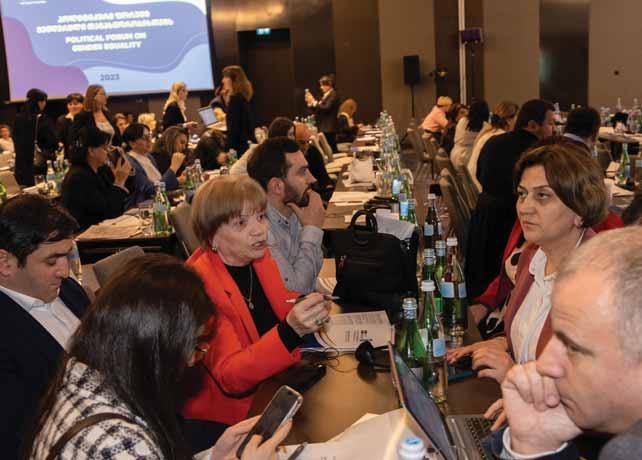
GEORGIA TODAY MARCH 3 - 9, 2023 3 POLITICS
Illegal Globalization is Russia’s Main “Ally” against the West
tools to complicate the economic situation globally. This confrontation between Russia and the West has manifested itself most clearly in the “Oil War” and the “Food War.”
On February 24, 2023, it was a year since Russia invaded the territory of independent Ukraine and kicked off a full-scale war. At the outbreak of the war, the West’s first response was to announce economic sanctions on Russia. This can be interpreted as the beginning of a Cold War, introduced by the West against Russia
- which is waging a hot war against Ukraine. Unfortunately, despite the best efforts of the West, these economic sanctions have failed to be as effective as expected, an unsurprising result if we take into account the fact that not all countries (for example, China, India, Israel, Turkey) have joined these sanctions, and those countries (this primarily includes the EU countries) that did impose these sanctions have left so called “holes” for the continuation of trade and economic relations with Russia.
As part of the West’s Cold War on Russia, the latter seeks to use a plethora of
At the same time, it must be emphasized that Western companies themselves seem to be trying to circumvent the economic sanctions imposed by the West on Russia. For example, 49% of the oil in the “Latvian blend” is Russian. It is under the guise of “Latvian blend,” as an oil cocktail, that Russian oil enters the world markets, including the US market. In addition to this fact, Russian oil was also supplied to the UK, despite being registered as an import from Germany, the Netherlands and Belgium.
The problem of Western companies conducting illegal activities in relation to Russia concerns not only the sphere of oil supplies to the West in circumvention of economic sanctions: Yale University researchers have been tracking the behavior of companies from those countries that imposed economic sanctions on Russia, and have found that more than 550 international companies, including American and European ones, still do business in Russia to one degree or another.
Unfortunately, then, despite the appar-
ent mass exodus of Western companies from Russia, Western trade relations with Russia actually remain at the level of the pre-war period. In other words, Western companies continue to prioritize profits over following the economic sanctions on Russia.
Against the undesirable background of Western companies circumventing the economic sanctions, the fact that Russia’s military power in the war with Ukraine is also increasingly bypassing Western economic sanctions is much more acutely perceived. In particular, the Iranian drones supplied by Tehran to Moscow are equipped with US and Western components. Despite the fact that Iran is under US sanctions, 82% of the components that make up the Iranian drones being used by Russia in the war with Ukraine are produced by US-based companies.
Logically, questions arise as to how Western companies manage to resell Russian oil or continue economic activity in the Russian market in circumvention of their own countries’ economic sanctions. We can also ask how 82% of the components produced in the United States are found in the composition of Iranian drones, as a result bypassing US sanctions against Iran.
The answers to these questions are
identical, since the possibilities for violating the economic sanctions lie in globalization itself, or rather, in illegal globalization.
Whether we want to admit it or not, some types of illegal business (for example, drug production and trade) are global in nature, and regardless of the fact that national governments and international institutions (for example, Interpol) have opposed such business for many years, they continue to exist. It is illegal globalization that confirms the nature of the irreversibility of globalization as such, and everything that prevents it does not lead to deglobalization, but to pseudo-deglobalization.
Thus, in the West’s confrontation with Russia, the latter’s main “ally” is illegal globalization, which allows interested companies to circumvent the restrictions imposed by the West’s economic sanctions on Russia.
Consequently, the main challenge for the West as it tries to weaken Russia is to strengthen global control over the implementation of its economic sanctions, and, above all, of those companies located in countries that officially adhere to these sanctions.
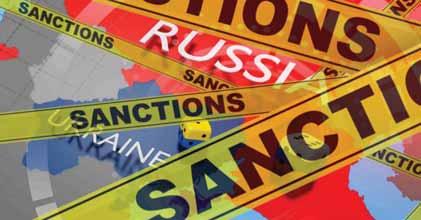
Amnesty International & HRW on Saakashvili: A Prison Sentence Should Not Mean a Death Sentence
Georgian authorities are denying former President Mikheil Saakashvili adequate medical care, putting him at grave risk of death, permanent disability, or other irreversible damage to his health, – Amnesty International and Human Rights Watch said in a joint statement.
According to the statement, the authorities have yet to respond to concerns the organizations outlined in a joint letter to the Georgian Ministry of Justice on February 10.
“The denial of adequate medical care to Mikheil Saakashvili may amount to torture or other cruel, inhuman, or degrading treatment, and is putting his life at grave risk,” said Denis Krivosheev, Deputy Director for Eastern Europe and Central Asia Regional Officer at Amnesty International. “Deaths in custody resulting from the deliberate denial of health care amount to arbitrary deprivation of life, which is a serious violation under international human rights law. The Georgian authorities should urgently take measures to protect Saakashvili’s health, including considering his release on medical grounds.”
Two independent medical teams have concluded that Saakashvili has developed a number of life-threatening health con-
ditions while in custody for the past 16 months. According to one of them, a group of forensic medical experts, Saakashvili is suffering from psychological, neurological, orthopedic, and gastrointestinal conditions that threaten his life and require medical treatment
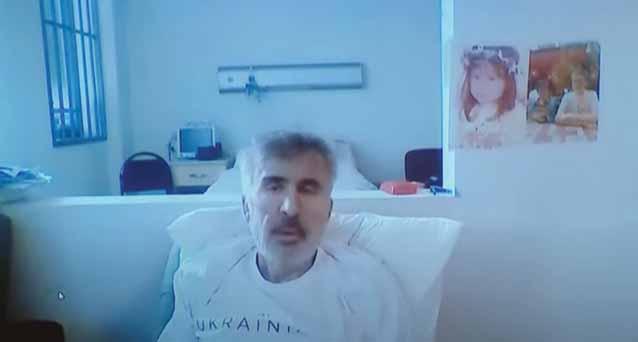
that is not available in Georgia. Furthermore, according to independent medical experts under the auspices of the Public Defender, who visited Saakashvili on February 19, his health has further deteriorated since their previous visit in December 2022, and he will soon face
irreversible organ damage.
Georgian law provides for courts to grant the release of seriously ill prisoners; however, such requests are often denied. On February 6, a court in Tbilisi declined Saakashvili’s motion, filed in December, to defer or suspend his
sentence on medical grounds. Saakashvili’s lawyers have appealed the decision.
“Medical decisions on the need for ongoing medical care and observation outside of prison or on releasing inmates on grounds of medical necessity should be taken by the responsible healthcare professionals and not overruled or ignored by nonmedical authorities. Georgian law should allow for healthcare professionals to assess the needs of their patients in prison and allow for them to be transferred to adequate facilities or for medical release where necessary,” the statement reads.
“A prison sentence should not mean a death sentence where treatable conditions tragically become fatal,” said Hugh Williamson, Europe and Central Asia director at Human Rights Watch.”
According to the statement, the Georgian authorities need to humanize this aspect of the country’s criminal justice system and bring it in line with international standards.
“They should start by providing remedies that guarantee prompt medical care and, where necessary, that envisage release from custody of anyone who is considered incapable of remaining in detention because of the state of their health”, reads the statement.
Speaker on Law on Transparency of Foreign Influence: The Discussion is Becoming Absurd
The Speaker of Parliament, Shalva Papuashvili, held a meeting with the EU Ambassador and the Ambassadors of the EU Member States for deliberation on the Draft on Transparency of Foreign Influence, and the Act on Registration of Foreign Agents.
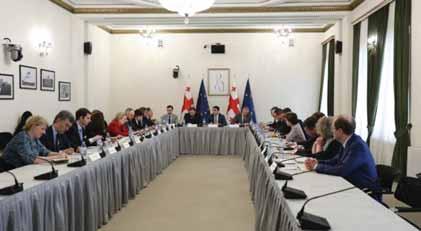
The Speaker noted that at the meeting, concerns regarding the Draft were discussed.
“We have initiated an exact copy of
the American Act, yet the Law is claimed to be not American but Russian. The [social] discussion is becoming absurd.
Some forces are trying to stigmatize the discussion. Despite the immense wave of said stigmatization, we have held long conversations about the importance of transparency, like yesterday’s meeting with NGOs. We have achieved an understanding that transparency concerning the actors engaged in the formation and adoption of political decisions is a request of our citizens, and
the Parliament is assigned to ensure the realization of this request. We discussed these needs, and declared that we intend to submit these Drafts to the Venice Commission for its opinions. Meanwhile, we have time aplenty to hold other discussions,” the Speaker stated.
He noted his hope that civil society will actively cooperate with Parliament instead of imposing stigmas and taboos, so as to enable them to eliminate the legal gaps related to insufficient transparency.
GEORGIA TODAY MARCH 3 9, 2023 4 POLITICS
Image source: Shutterstock
*Prof. Vladimer Papava, Senior Research Fellow, Rondeli Foundation
BLOG BY VLADIMER PAPAVA* FOR EURASIA REVIEW
Régis Genté - Everything Points to the Fact that the Gov’t Has a Deliberate Policy and Goal to Divert Georgia from its European Path
And as for Madam Zurabishvili, until the very first day of the war last year, she was saying that Mr. Saakashvili really is guilty of many things, and one of them is provoking the war back in 2008. But we understand now the question is not if Mr. Saakashvili really behaved well or not, and whether doing differently would have seen him preventing the war, but that Zurabishvili’s saying so pleased the Russians. She lost a lot of credibility because of that. And then she said she would never pardon Saakashvili. It seems to me that she takes politics too personally. When you are president, it’s not a question about what you think: It's about what you represent. Now she went too far to be able to come back on that, pardoning Saakashvili, I mean.
IN HER DEFENSE, HER STATEMENTS ON UKRAINE HAVE A DIFFERENT TONE THAN THE GOVERNMENT'S.
Absolutely. Since last February, she has been saying the right things on the war in Ukraine, and what she says is absolutely precise and fair, and about what the government is doing. She criticizes and plays a role similar to what Mr. Margvelashvili did before, so as to counterbalance the power structure, which is important for the country.
INTERVIEW BY VAZHA TAVBERIDZE FOR RFE/RL
If Russia wins in Ukraine, within a few weeks Georgia will be under the complete control of the Russians, and it probably won't even require military intervention – says French journalist and author Régis Genté. He knows the region well, having lived in Tbilisi for years now. He wrote the books "Putin and the Caucasus" and "Journey to the Abkhaz Region," and, after Russia's invasion of Ukraine, "Volodymyr Zelensky, in the Mind of a Hero" was published with co-author Stéphane Siohan. In this interview with him, we talk about this latest book, and also touch on presidents Putin, Macron and Saakashvili, and take look at Georgia’s faltering reputation on the international stage.
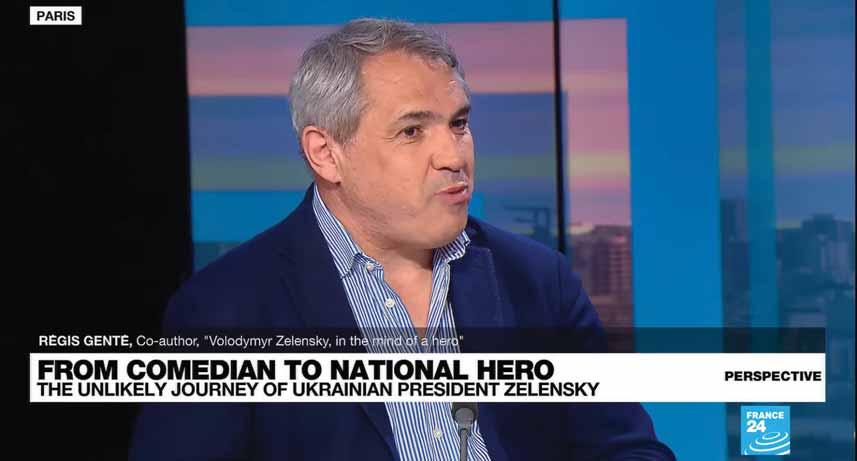
TELL US ABOUT YOUR BOOK ON VOLODYMYR ZELENSKY.
We wrote that book for a Western audience, even though it has since been translated into 16 languages, including Georgian, Chinese and Japanese. We agreed to write this book, as a proposal from the publisher, because we remembered the mood in France back in 2014, and how Ukraine was totally misunderstood, as were Russia and Georgia, and the whole region along with it, in terms of the very important impact of the proRussian narrative. We thought it important to speak about what Ukraine is, what is this war about, and what Russia wants.
WHAT WOULD YOU NAME AS ZELENSKY’S MOST ICONIC MOMENT IN THE WAR SO FAR FROM A PR POINT OF VIEW?
I won't be very original, but it is, of course, the very first video on February 25 last year, when he was on Bankova Street and said: “Ia tut” (I am here). That day, the Russians were about to take the Hostomel Airport some 30 kilometers from Kyiv, and the best Russian forces from the Pskov paratroopers were landing. The idea was to take Zelensky and the whole ruling elite of Ukraine. We know that there was a big threat hanging over his head, and the propaganda was huge that evening in the Russian telegram channels, claiming Zelensky was already in Poland and so on. And he said, Ia tut.
It was really well done. “I am here, I'm not going away.” And indeed, the fact he has managed to remind the world every day since who the victim of this aggression is and what is at stake in this conflict plays a very important role.
IN THE EARLY PAGES OF YOUR BOOK, YOU RECALL CASES WHEN HE BECAME FLUSTERED BY QUESTIONS HIS TEAM HADN’T PREPARED HIM FOR. HOW MUCH OF “ZELENSKY THE ACTOR” ARE WE SEEING TODAY?
I personally see more of the head of a state which is at war. Of course he's staging, he knows how to speak. But I also see someone who is genuinely responsible, and who is also doing things in the interest of his country. When he had to talk with the Republicans in the US, and when he had to go to London and Paris to speak about air defense to try and get some aircraft from the West - he doesn't go just for the show, but because there is something at stake.
WHOEVER HIS SPEECH WRITER IS DEFINITELY DESERVES AN OSCAR (OR WHATEVER THEY'VE GOT FOR SPEECH WRITERS).
It’s someone who was writing the speeches for his comedy series, a young man, and he definitely knows how to write. But, apparently, Zelensky also likes to include his own thoughts, to put the final words to these speeches.
THE FIRST 100 PAGES OF YOUR BOOK SEES THE WORD CLOWN USED AS CRITICISM AIMED AT ZELENSKY. THE OTHER 100 PAGES HAVE AROUND THE SAME AMOUNT OF MENTIONS OF “CLOWN,” BUT THIS TIME IN QUOTATION MARKS. WHY THE CHANGE?
Because at the beginning, he was seen as a clown, that he was not serious and was unaware of what was happening. This is why until the very last day he didn't believe there would be a war. He didn’t understand what was all at stake. He was elected on two pillars, one to bring peace to Donbas, which was very naive, of course, because you can only talk about that with Mr. Putin, and two, to fight against the oligarchs. We tried not to judge in this book,
because it's extremely difficult to deal with an oligarchy wherever you are in the world, because you can destabilize a country very quickly in doing so, though probably not in regard to Georgia, where there is one oligarch, not an oligarchy - it's a bit different. In Ukraine, you have Renat Akhmetov giving out maybe 300,000 salaries each month, so you can really destabilize the country by shutting him down. Also at stake is control of the media and political parties and so on.
IN YOUR BOOK ZELENSKY IS TRANSFORMED INTO SOMETHING OF AN ESTEEMED FIGURE, A COURT JESTER WHO TELLS THE WORLD, WHICH IS MADE UP OF LADIES AND GENTLEMEN DRESSED IN SUITS AND TIES, THE TRUTH, WHILE HIMSELF WEARING A KHAKI SHIRT. They didn’t expect he would dare to do so. It says a lot about their communication, how they see themselves. But it needed to be heard by the West. We’re not going to go back to business as usual. This is war.
NO MAN HAS DEFINED ZELENSKY’S PRESIDENCY AS MUCH AS PUTIN HAS. THE TITLE OF YOUR BOOK IS “VOLODYMYR ZELENSKY, IN THE MIND OF A HERO.” IF YOU WERE TO WRITE A BOOK ABOUT PUTIN AND CHOOSE A TITLE, WHAT WOULD IT BE?
I don't know. Putin is a statesman who has a passion for Empire and greatness, and he knows that Russia is not that great, that he's not that big. There is a famous book in France, published in 1993 and titled, “Russia - the Poor Power.” And most of the strategy behind what Russia and Putin do is based on their being aware that Russia is a poor power and trying to compensate. Its economic poverty prevents it from competing with the US, but it wants to compete. Putin is a dreamer, and he dreams about Russian greatness. It explains a lot about what Russia is. I don't want to insult Russia by saying this; I’m trying to understand, to decipher what drives him, what drives Russia. This war is a way to say to the world, “I'm the most important.” But China has ten times the GDP, and in
a few years Russia will be a slave to it, deeply dependent on them, they already are, so the China problem is 10 times more important than that of Russia. But when you switch on the news, especially if you're a Russian citizen, you feel that Russia is the most important country in the world, the most powerful, which is perhaps one of the roots of this war.
LET’S TALK ABOUT THE MASTER JUGGLER PRESIDENT MACRON, WHO ONE MINUTE SAYS HE’S WITH THE UKRAINIANS UNTIL THEIR VICTORY, THEN SAYS RUSSIA MUST NOT BE CRUSHED OR HUMILIATED. AND HE’S STILL ON THE PHONE WITH PUTIN. WHAT’S HIS GAME? Macron has a problem - he doesn't know intimately what Russia is. The opinion in France, especially in the ruling circles, in the army, diplomats, business circles and so on, where you have quite an important segment of the population, they are maybe not pro-Russian, but certainly anti-American. Macron is taking that into account. One day, he can sound like a Russlandversteher, as we say in German, and appear as if he has too much affinity for Russia, and sometimes he can be very tough. He doesn't know where to be.
NOW TO THE ZURABISHVILI AND SAAKASHVILI DRAMAS –ONE OF WHOM HAD FRENCH CITIZENSHIP, ONE WHO HAS UKRAINIAN. WHAT’S YOUR TAKE ON IT ALL?
I think the question of Saakashvili goes back to your earlier question about the image of Georgia on the international stage. We all understand that in a country where rule of law worked perfectly, Saakashvili could be considered to have made some mistakes. But Georgia is not such a country, and Saakashvili is a political prisoner right now. Saakashvili is a personal enemy of Mr. Ivanishvili, because of what he represents for the country. But we see the procedures are not respected, there are a lot of violations, a lot of prejudice. The way they speak about Saakashvili, say that Saakashvili is pretending - he lost more than 50 kilograms within a year! This is a fact signed off by doctors! How can you say that someone who lose almost half his weight within a year is in “good health”?
WHAT DO YOU THINK THIS WAR, OR RATHER TBILISI’S STANCE ON IT, HAS DONE FOR GEORGIA'S INTERNATIONAL IMAGE?
I think it has had a really bad affect. If the position really was as it is being presented by the ruling party, Georgian Dream, that they are just being cautious with Russia, I would understand, because it is a real issue. Georgia is under threat - If Russia wins in Ukraine, within a few weeks Georgia will be under the complete control of the Russians, and it probably won't even require military intervention. But it is more than that. Everything shows there is an ongoing policy to move Georgia off the European path it was on, and this is a bit difficult for Westerners to understand, because Mr. Ivanishvili, who is the real ruler of this country, knows that 98% or 99% of Georgians are pro-European.
Some say we should be cautious, and some say we should do everything we can to join NATO and the European Union. But we see that when you decide conscientiously to insult the representatives of the US and Europe, it's a policy: Everything is being done to ensure that Europe will not want you in the family. This is the image now, and it is being done on purpose.
People would understand Georgia not wanting to join the sanctions against Russia, as it is a very small country and nobody can really protect it. But insulting the Europeans is not necessary. Most of the other post-Soviet republics are also cautious: Tokayev in Kazakhstan, Pashinyan in Armenia, and so on, they are very cautious. We understand they are against this war, but they don't say it to Russia because they have to protect their country, and they don’t throw insults at the West.
This dimension of insulting the West systematically for months, and now this law on foreign agents, which is just a copypaste of the Russian law, it's absolutely clear, even the name of the law is the same. What I have seen in these past 20 years is the non-democratic regimes, and Mr. Putin with them, slowly trying to challenge the Western democracies, the democratic way of governance. Georgians are being deeply affected by this, and if Russia wins this war, then the democratic Georgia that we know will disappear. I hope this law on foreign agents is not the first sign of that already happening.
GEORGIA TODAY MARCH 3 - 9, 2023 5 POLITICS
French journalist and author Régis Genté. Source: France24
Let’s Toss a Coin – Closed or Open Society?
OP-ED BY NUGZAR B. RUHADZE
Among the reasons for war, ideological ones are most commonplace. The war in Ukraine, for instance, has a shade of imperial Russia’s territorial voracity and Ukraine’s instinctive reaction to defend the motherland, but in reality, this is a war between two diverging concepts of world order and two contradictory perceptions of how to build human society. The clash is taking place between two strongly differing desires of Man to live in either a closed society or an open one, but in both cases, one which is sustainable, prosperous and free enough to allow people happiness. Our civilization has turned this contradiction into the subject of serious controversy. If a society wants to qualify as good, there must be a certain amount of openness in it, but most scholars argue that no society can be completely and unreasonably open, for the simple reason of keeping itself from anarchic compli-
BUSINESS
cations. Even if a society is perfectly open, free, progressive and democratic, the fundamental interests conducive to making it safe would ask for the acceptance of laws and regulations which restrict people in their actions and behavior. So, whether closed or open, there are some fundamental rules that apply to both.
And still, the fight between them is fiercely on, and here is the freshest example of this: Russia tends to stick to what we call the closed type of society, giving fewer chances to individuals than to the state. Ukraine has opted to do the opposite, giving preference to free speech, individualism and human rights. As such, Russia and Ukraine were unable to avoid the conflict, having embarked on the solving of their differences via fire and death. Our Georgia is at the crossroads between both societal options right now - gingerly deliberating its future moves.
This way or that, both Russia and Ukraine are now in a situation where no intellectual way out will be effective.

The solution can no longer be found in
love and mutual understanding, only in using the tongue of stubborn violence. Now, all depends on the availability of modern technology and fire potential, in which case the importance of said ideological differences becomes irrelevant, especially when on the raging military frontline. Here, human ideals, lofty values and reminiscing about “the good old days” have no power, no mat-
ter what kind of societies the parties want to build. In a word, the concept of societal closeness or openness is retreating, giving way to modern weaponry, including nuke capability, so far only theoretical, but still considered as a potential to overpower the other.
Ironically, after the war, both nations might find themselves standing on land where building any kind of society, be it closed or open, is impossible. Frightening and frustrating equalization might then reign between the two ways of life, seeing nothing making sense. Would it be a relief to any of the parties if they found some theoretical justification for their social and political ideals? Probably not. The only thing that might matter could be their regret that they gave external influence of any sort a chance to destroy their mutual love and understanding, built over the duration of centuries. But they missed that regret, focusing instead on their newly-born ideological differences, which have already taken hundreds of thousands of innocent lives.
Social changes have the potential to
bring in instabilities, and instability has a proclivity to chip away at national freedom and prosperity. In the historically tolerant relations that Russia and Ukraine long enjoyed, neither the advantage of individualism nor the disadvantage of zero cultural pluralism meant much. The only difference-maker would have been recognition of the new geopolitical exigencies brought around by the astonishingly altered times. The two sister nations have all of a sudden created a clearly insurmountable chasm between them, but not without the help of those who think that for human happiness one should necessarily recognize the difference between two types of societies, closed and open. These are the two images of our reality, and who knows which is better: Giving nations a chance to make their own choices, or imposing one of these models on unsuspecting peoples? Let’s not exclude that the goal of both models should be to let people live well. And the solution might very well be found in a third way, especially in our world of crazy technological progress and consequential changes.
USAID Agriculture Program Hosts Market Access Facilitating Event
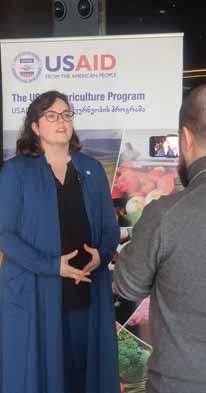
need and how to access those markets while at the same time providing the members of the retailers’ association with the more stable reliable and higher quality domestic supply,” said Marika Olson, Economic Growth Office Director at USAID Georgia. “This is better for their bottom line and, of course, helps farmers as well, so this is one step further in USAID supporting the modernization and development of Georgia’s agriculture system and wider economy, which we’ve been working on for the past 30 years.”
BY EREKLE POLADISHVILI
On February 28, the USAID Agriculture Program hosted the Market Access Facilitating event at the Event Hall Republic in partnership with the Retail Association.
The purpose of the meeting was to stimulate and facilitate the entry of Georgian products into domestic retail chains.
The event included a presentation of the new Commercial Guide developed by the Retail Association, which will act as a resource for Georgian producers interested in entering retail chains.
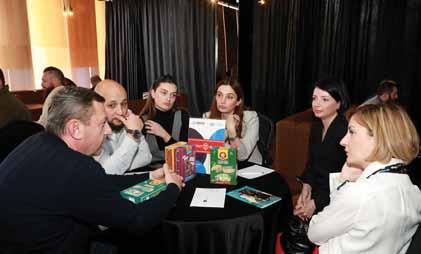
“This guidebook will help farmers understand what the individual markets
The event also included a panel discussion highlighting the challenges faced by retailers and suppliers and a series of B2B meetings between Georgian agribusinesses and retail chain representatives, among them Goodwill, Agrohub, Daily and Carrefour, with the goal of increasing the number of Georgian products available in domestic retail chains.
“I really believe that entrepreneurs in Georgia and retailers need to meet, need to exchange, need to negotiate in order to provide the best quality at the best price for Georgians,” noted Jerome Adel, Country Manager of Carrefour Georgia.
“The forum we had today on the occasion of the release of a guide book published by USAID is of importance to bridge the gaps and to build the understanding between partners.”
The event brought together producers and retailers, both of whom have the shared goal of increasing domestic sales and expanding the market for Georgian agricultural products, which will have a significant positive impact on the industry and Georgia’s economy as a whole.
“Today’s meeting, organized by USAID, was truly interesting for me as a producer,” said Zurab Gojiashvili, Tirifoni Fruit, Director. “Retailers, big and small, have always been a bridge between our customers and us, and that’s why such events are essential. It will help us build trust with each other. Once again, I’m thankful to USAID for this and other initiatives which help the Georgian agriculture and food industry improve.” For over 30 years, USAID has shown unwavering support for Georgia’s democratic and economic development and will continue so in the name of the American people.
Geostat: Food Prices Up 14% on February 2022
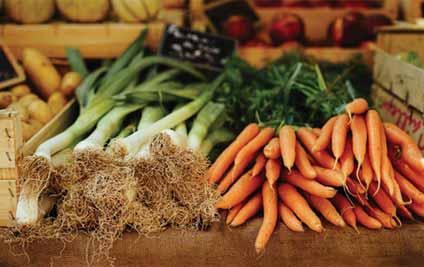
In February 2023, the Consumer Price Index decreased by 0.3% compared to the previous month, the annual inflation rate amounted to 8.1%, while the prices on food products increased by 14.0%, reads the report by National Statistics Office of Georgia (Geostat).
With regard to the annual core inflation, the prices increased by 6.5%, while the annual core inflation without tobacco amounted to 6.6%.
The monthly inflation rate was mainly influenced by price changes for the following groups:
Health: the prices for the group decreased by 4.9%, with the relevant contribution of -0.47 percentage points to the monthly inflation rate. Within the group, the prices were lower for medical products, appliances and equipment (-8.1%). At the same time, prices increased for hospital services (1.3 percent);
Transport: the prices for the group
decreased by 1.5 percent, contributing -0.19 percentage points to the overall index. Within the group the prices decreased for the subgroup of operation of personal transport equipment (-3.7%).
At the same time, prices increased for transport services (3.1%) and purchase of vehicles (1.8%);
Food and non-alcoholic beverages:
The prices for the group increased by 1.2%, contributing 0.37 percentage points to the overall monthly inflation rate.
The prices increased for the following subgroups: Vegetables (10.2%), mineral waters, soft drinks, fruit and vegetable juices (2.8%), fruit and grapes (2.2%), meat (1.5%). At the same time, prices decreased for the subgroup of milk, cheese and eggs (-2.3%).
The annual inflation rate was mainly influenced by price changes for the following groups:
Food and non-alcoholic beverages: The prices in the group increased by
14.0%, contributing 4.73 percentage points to the overall annual inflation rate.
Within the group the prices increased for the following subgroups: Vegetables (25.8%), bread and cereals (21.0%), milk, cheese and eggs (17.2%), coffee, tea and cocoa (14.5%), mineral waters, soft drinks, fruit and vegetable juices (12.2%), fish (12.1%), meat (10.2%), sugar, jam, honey, chocolate and confectionery (9.8%).
At the same time, prices decreased for the subgroup of fruit and grapes (-0.3%). Housing, water, electricity, gas and other fuels
The prices for the group posted a 12.4% increase, which contributed 1.3 percentage points to the annual inflation rate. The prices were higher for the following subgroups: Rentals for housing (38.7%), maintenance and repair of dwellings (7.4%)
Health
The prices decreased by 7.6%, with the
relevant contribution of -0.79 percentage points to the annual inflation rate. Within the group, the prices were lower for medical products, appliances and
equipment (-19.2%).
At the same time, prices increased for out-patient services (13.8%) and hospital services (8.0%).
GEORGIA TODAY MARCH 3 9, 2023 6 POLITICS
Engaging CSOs in Designing the National Climate Policy
BY KATIE RUTH DAVIES AND ANA DUMBADZE
The poor engagement of Civil Society Organizations (CSOs) in national climate policy design and formulation in Georgia is seen for a multitude of reasons, among them a lack of understanding of climate policy processes, institutions and actors, weak strategies for policy engagement, lack of valid data, inadequate use of evidence, poor communication approaches, and working in an isolated manner and a limited capacity over policy influence.
CSO engagement at the local level is even lower, but CENN has, since January 2021, been tackling this within the frames of the EU-supported Georgia Climate Action Project (GEOCAP), promoting civil society engagement in climate change policy design and implementation with the project’s partners KRDF, ACU, YPU and RLS-ADA. The project aims to strengthen the role of CSOs in tackling climate change by establishing a multi-stakeholder national platform and regional climate action groups (CAGs) on climate change, and by building trust and collaboration between state and non-state actors for increased climate change resilience and water security.
The project is based on the vision that a strong and competent civil society fosters self-reliance and resilience by supporting the state as the main provider of social services. The levels of civil society development in Georgia’s regions varies, as do the environmental challenges linked to the wellbeing of the population. CSOs in the regions tend to be more focused on service provision and do not engage in policy development, as they lack the necessary skills, incentives and resources to do so. Institutional stability and financial viability continue to be a challenge for CSOs due to limited access to information, networks, qualified professionals and other critical skills and resources.
“In order to increase resilience to climate change, the project aims to strengthen the role of civil society in the fight against climate change through the constructive engagement of stakehold-
ers in the climate change sector,” says CENN Project Manager Nino Tevzadze.
The project is working nationwide, engaging with CSOs and other actors at national and local levels in 10 municipalities of the four target regions of Guria, Imereti, Kakheti, and Racha-Lechkhumi and Lower Svaneti. The project empowers local CSOs in their actions for inclusive governance and equitable development, demonstrates the benefits of innovative projects on water security contributing to climate change mitigation and the adaptation and protection of human health and the environment, as well as increasing awareness and recognition of the role of CSOs in advocating for the protection of the environment and human health. The project is strengthening some 50 CSOs. In all, up to 200,000 people will be reached in the 10 target municipalities.
“One of the directions of the project is the grant component, within the framework of which CSOs in the target regions have the opportunity to solve climate change-related issues existing at the local level with the support of the project,” Tevzadze tells GEORGIA TODAY. “We are glad that in this way we have the opportunity to encourage the implementation of innovative projects in the regions, which will contribute to climate change mitigation and adaptation to it, and to create successful examples in this direction, which could be replicated in the future.”
The project is working to:
1. Establish a multi-stakeholder National Climate Platform (NCP) and regional Climate Action Groups for facilitating engagement of civil society in formulation and implementation of climaterelated strategies;
2. Facilitate multi-stakeholder participatory processes to identify and assess priority issues linked to climate change vulnerability and water security, and demonstrate the implementation of successful joint measures;
3. Offer financial support and technical capacity building to third parties for implementing innovative projects on water security contributing to climate change mitigation and adaptation, community resilience building and protection of human health and the environment;
4. Conduct awareness-raising activities promoting the role of civil society in advocating for protecting the environment, climate and human health, ensuring project visibility to encourage replication.
One of the beneficiaries of the subgrant component is non-governmental organization Community Union “Sveri,” which is working in the Imereti region.

The aim of the Sveri project was to introduce a renewable energy solution, namely solar panels and the accompanying system, in the public school of Sveri
(Chiatura municipality), and to support in its implementation. Further, the aim of the sub-grant is to raise the awareness of local community members of the village on climate change-related issues and the importance of renewable energy in the context of climate change.
GEORGIA TODAY spoke to Tamaz Tsutskiridze, Representative of the Community Union Sveri, and Acting Director of the Sveri Public School.
“Our partner organization informed us that CENN, within EU funded project, had announced a grant competition for CSOs to fight against climate change, and that 10 projects were to be funded.
“The solar panels have been installed. We just need to deal with some legalities concerning Energo Pro Georgia, after which, we can start using those panels,” he tells us.
“The benefits we expect from this project are that it will reduce utility costs for Sveri Public School and, at the same time, contribute to the health and improvement of the country’s energy. The use of free solar energy is an important innovation; no such project has been implemented in our municipality before. There is also interest from the public and it is possible for private individuals to follow our example and to purchase a similar micro power plant.
“In addition, the pupils also carefully observed the installation of these panels, which helps to raise their awareness about renewable energy in the context
of climate change and energy efficiency and its importance,” Tsutskiridze says.
“We are grateful to CENN for giving us the opportunity to implement a project of this scale. We are also grateful for the support we have had from the local government and the municipality. The contribution and determination of the school staff and the board of trustees is also worth mentioning.
“In the future, of course, we will try our best to implement steps and projects focused on energy efficiency and the green economy, so that the next generation can live in a healthy environment,” he notes.
Lia Kotrikadze, Co-founder of Community Foundation “Lotus,” a wind belt project in Ozurgeti, tells us that when the competition for grants was announced, she and her colleagues decided to participate in it to solve a very acute problem in their community – the cut and burned wind belt in Ozurgeti, which has resulted in serious problems for the population living nearby, especially during strong winds, both in terms of safety and soil erosion.
“We decided to take action to solve the problem and got involved in the CENN project,” she tells us.
“They liked our idea, after which I underwent training at the Bulachauri Green Center, among highly qualified professionals and trainers of CENN, who gave me very useful experience. After that, we received funding for our project
and started the implementation of our initiative. The local City Hall actively supported us in this process, for which we’re very thankful.
“The arrangement of the wind belt and planting of seeds is almost completed, as is a fence which was put up to protect the young seedlings.
“Importantly, based on the agreement reached with the local authorities, the wind belt will be monitored by a specially allocated ranger, who will be responsible for it in times of drought, protecting it from animals, etc., until the trees are fully grown.
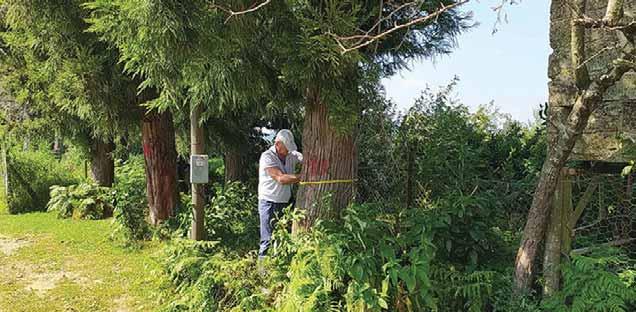
“The local population were actively involved in this process voluntarily. Information about our project was actively spread and contributed to raising awareness. Informative material was printed about the project, and flyers, made by pupils of the Ozurgeti public school ecoclub, were distributed. As such, the project contributed to raising awareness among the young generation about the importance of mitigation and adaption to climate change and, in general, about protecting the environment. The project was very large-scale and interesting, and we’re grateful to the EU and CENN for giving us this opportunity.”
Source: CENN
GEORGIA TODAY MARCH 3 - 9, 2023 7 BUSINESS
Community Foundation “Lotus,” a wind belt project in Ozurgeti, worked to solve a very acute problem in their community – the cut and burned wind belt in Ozurgeti, which has resulted in serious problems for the population living nearby
The project empowers local CSOs in their actions for inclusive governance and equitable development and increases awareness and recognition of the role of CSOs in advocating for the protection of the environment and human health
We will implement steps and focusedprojects on energy efficiency and the green economy, so that the next generation can live in a healthy environment
Giorgi Machabeli - Prince of Perfumes
TRANSLATED BY KETEVAN TUKHARELI*
In 1955, in the USA, the number of the first (1921-1939) and second (1945-1950) stream of Georgian emigrants did not exceed 300, however, this small diaspora was to have an important impact on the military and civil life of America. Renowned Georgians are responsible for influencing five fields in America in particular: Giorgi Kobakhidze (George Kobi) – the glass industry and glass Christmas tree ornaments; Alexandre Kartvelishvili (Alexander Kartveli) – the air force; Giorgi Balanchivadze (George Balanchini) – ballet; Giorgi Machabeli (Prince Machabeli) – perfumery. In Georgia’s struggle for independence, Giorgi Machabeli revealed a wonderful gift and ability to perform the most dangerous and difficult tasks., traveling boldly from one country to another, negotiating with both government and revolutionaries, and making a great impression on all.
He was in Belgium when World War I began. He showed the liberation plan of Georgia to Governor General von Der Holtz, and intrigued him to such an extent that he was sent to Mikhako Tsereteli by car, after which both went to Berlin to join the Georgian Independence Committee from Geneva. In 1922, Giorgi decided to settle in America. Two years later, in New York, he opened antiques shop ‘The Red and the Black’ and soon won acclaim. In parallel, he worked on an old hobby of his – perfumery, and, on finding that his
clients were more interested in his perfumes than his antiques, he gave up the shop, and in 1926 opened his own company which created and packaged perfumes and designed the advertisements. Within four years, the perfumery was prestigious.
It is difficult to say which perfume of Giorgi Machabeli’s was most successful, but the use of the gold gilded Royal crown taken from Machabeli’s own family emblem, chosen to decorate the perfume bottles, was a lucky choice. The perfume
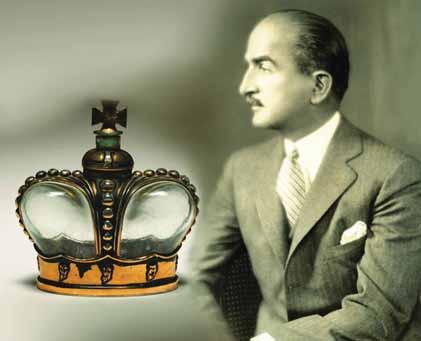
‘The Queen of Georgia’ particularly inspired American society. Soon, this was followed by the perfume ‘The Princess Norina’ dedicated to his wife, the
perfume ‘Duchess of York’ named after the English beauty, ‘The Golden Autumn’, ‘The Bathroom Oil’, ‘The Bath-House’, the eau-de-cologne ‘The Song of the Wind’, and pressed powder and lipstick. All were beautified by the ‘Crown of Prince Machabeli’.
The fine publicity announcements made up by Machabeli are wonderful proof of his genius.
“‘The Bath-House’ oil by Prince Machabeli, poured in a small quantity into warm water, will bring you pure pleasure. Let your body soak it up, and sink into the Eastern aroma. Find time for yourself to enjoy this luxury. It will heighten your mood, set you free from
EU Agrees 24 New Guarantee Programs to Boost Investments in Partner Countries
The European Fund for Sustainable Development plus (EFSD+) has endorsed a further package of 24 guarantee programs to support investments in the EU’s neighborhood and enlargement countries.
The new guarantees, worth €2.4 billion, are expected to generate investments in the order of €17 billion in priority sectors, including renewable energy, digital connectivity and private sector competitiveness, under the EU’s Economic and Investment Plans (EIPs) for the Western Balkans and South and Eastern Neighborhood.
The European Fund for Sustainable Development Plus (EFSD+) is part of the EU’s investment framework for external action and ensures worldwide coverage for blending, guarantees and other financial operations.
With the signing of guarantee agreements between the EU and 11 European and international financial institutions, such as the European Investment Bank (EIB), the European Bank for Reconstruction and Development (EBRD) and national development banks, these institutions will have three years to obtain investments in relevant areas, such as the Black Sea connectivity in the Eastern Neighborhood. The EU guarantee is also expected to increase banks’ finance for small and medium enterprises, as well as to increase the issuance of green bonds in the EU partner countries.
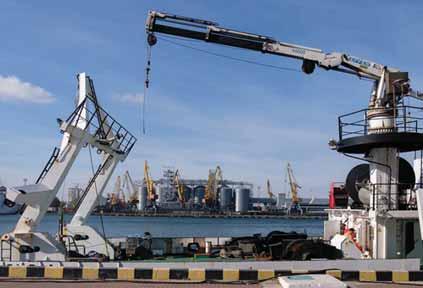
WHAT IS THE EU’S NEW ECONOMIC AND INVESTMENT PLAN?
The Eastern Partnership’s agenda for recovery, resilience and reform is underpinned by an ambitious Economic and Investment Plan. Over the next five years, this plan will mobilize €2.3 billion from the EU budget in grants, blending and guarantees, to stimulate jobs and growth, support connectivity and the green and digital transition.
But this is just the starting point: The EU’s support under the Economic and Investment Plan should facilitate further
public and private investments, by joining the forces of the EU, the European Investment Bank, the European Bank for Reconstruction and Development, and other International Financial Institutions, as well as development finance institutions from the EU Member States, partner countries’ national, regional and local governments, municipalities where relevant, and private investors. In this way, the plan is expected to leverage up to €17 billion in public and private investments to support the post-pandemic recovery.
The plan will combine actions to be implemented at the local, national and regional levels, and will be adapted to the specific needs of each partner country.
The Economic and Investment Plan underpins the Investment pillar of the post-2020 priorities for the Eastern Partnership, which supports post-COVID 19 socio-economic recovery and the aim to build back better through accelerating the green and digital transition.
However, these investments must be combined with clear progress in the fields of judiciary reform, public administration reform and human rights, the Governance pillar, which includes support for democracy, human rights, rule of law reforms, support for the fight against corruption, gender equality, support to civil society and independent media, all key values of the European Union, and the basis of a strong society that provides for its citizens.
WHAT ARE THE PRIORITY AREAS FOR INVESTMENT?
Transforming the EaP economies to make them more resilient and integrated has become even more urgent in the context of the post-COVID recovery.
In line with the long-term policy objectives for the EaP beyond 2020, investments will be focused in the following main areas:
• Better transport connections
• Access to
nance for SMEs
gration in EU value chains
• Digital transition
• Sustainable energy
• Environmental and climate resilience
• Health resilience
• Education reform and youth opportunities
However, for such investments to be effective and to foster development that is sustainable, improvements to the policy and regulatory environment are essential. The EU’s support will reflect its conditionality and incentive-based approach, and investments must be combined with clear progress in the fields of judiciary reform, public administration reform and human rights.
WHAT DOES THIS ACTUALLY MEAN FOR THE PARTNER COUNTRIES? HOW WILL THE INVESTMENT FILTER THROUGH, AND WILL WE FEEL THE DIFFERENCE?
The Economic and Investment Plan contains a set of five flagship initiatives for each of the partner countries. These are concrete projects that will have a direct impact on people and businesses on the ground.
While the plan is a key part of the European Union’s support for recovery following the COVID-19 pandemic, it aims to do so by advancing each country’s strategic interests, supporting longer-term resilience and competitiveness, and delivering tangible benefits. The flagships have therefore been identified jointly with the partner countries, taking into account their own priorities, needs and ambitions.
WHAT ARE THE SPECIFIC INVESTMENT PLANS FOR GEORGIA?
Georgia has identified transport and digital connectivity (in particular through the Black Sea) and digital development as key priorities. Support for SMEs, access to finance and boosting export potential also feature high on Georgia’s agenda.
THE FIVE FLAGSHIP INITIATIVES
tiredness, caress you. In the evening, when you go somewhere, know you’ll be surrounded by its magic aura ($1.50).”
“‘The Golden Autumn’ perfume by Prince Machabeli is a very modern, delightful fragrance with a hint of ginger. If you wish to be as good as its name, spray it proudly and with pleasure. It will guarantee something wonderful. Place some drops on your wrists, elbows, at your neck, and behind your ears. Follow these rules of use to guarantee a good fragrance ($4.00).
Machabeli’s perfume bottles were first made of porcelain, then at George Kobi’s glass company they made the now renowned glass bottle, which, as the encyclopedic reference book remarked: ‘is considered to be the best handmade specimen of a glass bottle of perfume’. It was made in a half-automated way, as the gilding with gold, the preparing of the golden incision and the laces were made by hand.
Soon, Machabeli had spread his ‘Machabeli Crown’ all over America. His enterprise overcame the crisis of 1930 and placed him among the front-ranking businessmen.
The first workers of the firm were his friends, the refugee aristocrats, their wives and daughters. It was a team of noble working personnel.
Within 10 years, Giorgi Machabeli had made not only a million-dollar business from a mere hobby, but had become an innovator as well, as America had no perfumery industry of its own until he arrived on the scene. Before the Machabeli enterprise, bad copies of French production were the norm – and very expensive ones too. For most at the end of the century, simple scented flowers
fastened to clothing were the only options. Thus, Machabeli, by means of his hobby, supplemented that gap in the market and greatly boosted the American perfumery industry.
Business did not prevent him from social activity, and he was among the initiators of founding the Georgian Association of Countrymen in the US in 1931.
In 1933-1934, he was the chairman of this association, and from 1934, its treasurer. He attended to his duty and materially helped the association and all Georgians in need, while ambitiously seeking to create new business and pave the way to the world market. “His second aim is to get involved in the Georgian political struggle for independence, with his friends,” wrote Spiridon Kedia.
In June 1935, he as all set to open a new, elegant exhibition hall. He invited the best decorator, the British painter Secil Betin, and photographer Pavel Chelishev, but sadly it was a project he never got to see finished: In March that year, on a trip from California to Shanghai, he caught a cold which led to pneumonia. Such illnesses were generally treatable at the time, but nonetheless, Machabeli passed a week later.
The firm ‘Prince Machabeli’ still exists today, in Connecticut, still a worthy competitor of world famous perfumery firms. The production is issued with the name of its founder, and it still bears the emblem created by Giorgi Machabeli, the Georgian royal golden crown, which happens to also be the emblem of the ‘Giorgi Machabeli Fund’ recently founded in Tbilisi.
* Ketevan Tukhareli’s English Translation of Rusudan Daushvili’s Georgian article (The journal ‘Historiani’)
FOR GEORGIA ARE:
1. Black Sea connectivity — improving data and energy connections with the EU – This initiative will further integrate the Georgian market with the EU market through the deployment of a submarine fiber optic cable. Citizens will benefit from a faster and more stable direct internet connection between Georgia and the EU. Further interconnectivity on energy between Georgia and the EU will also be promoted with a technical and economic feasibility study for deploying a submarine electricity cable between Georgia and the EU. The overall cost of the investment is estimated to amount to up to €25 million.
2. Transport connections across the Black Sea — improving physical connections with the EU – Among other things, this flagship will involve developing new ferry services and refurbishing ports, which will promote trade in goods and facilitate the movement of people by creating a direct link with the EU Member States. Improved connections will boost trade and economic cooperation, and strengthen Georgia’s role as a bridge between Europe and Asia. The overall cost of the investment is estimated up to €100 million.
3. Sustainable economic recovery — helping 80,000 SMEs to reap the full benefits of the DCFTA – Support will include equity investments to accelerate
the integration of Georgian SMEs into wider EU value chains, contributing to the diversification of trade between the EU and Georgia. A significant part of the EU’s support will go to SMEs in the agrifood sector. The overall support reaching SMEs is estimated to amount to €600 million.
4. Digital connectivity for citizens — high-speed broadband infrastructure for 1,000 rural settlements – This flagship will reduce digital inequalities by developing high-speed broadband infrastructure for around 1,000 rural settlements and strengthening ‘last-mile’ connectivity. This will contribute to economic development and recovery, while promoting digital inclusion in line with the national broadband strategy. The overall investment is estimated to amount to up to €350 million.
5. Improved air quality — cleaner air for over 1 million people in Tbilisi – In the coming years, the EU will work on improving air quality monitoring in Georgia by installing air monitoring equipment and building capacity. Besides work to identify pollution sources, concrete investments will be made to improve the situation. The initiative will also contribute to investment in green and sustainable urban transport in Tbilisi by building two urban cable-car lines. The overall investment is estimated to €100 million.
GEORGIA TODAY MARCH 3 9, 2023 8 BUSINESS
Giorgi Machabeli and his perfume. Image source: kvirispalitra
fi
Improved competitiveness
inte-
•
and
New ferry services will be developed and ports refurbished, which will promote trade in goods and facilitate the movement of people by creating a direct link with the EU Member States
The Expat Lifestyle: George Welton, a British "Public Policy Professional," Here to Stay

business association in Georgia and so is very influential in Georgia. This basically makes me a 'public policy professional' - so I work on business climate issues, legislative reform and investment promotion. This ties to my academic background in international relations and economics.
TELL US ABOUT YOUR FAMILY. ARE THEY ALSO THRIVING HERE IN GEORGIA?
INTERVIEW BY KATIE RUTH DAVIES
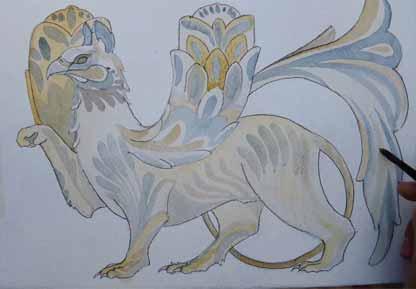
Our new regular column
“The Expat Lifestyle” sees us out and about meeting expat business owners who have chosen to make a life in Georgia. We’ll be finding out about their lifestyle, hobbies, culture, likes and dislikes about Georgia, and how this life compares with that abroad. For our second interview, GEORGIA TODAY sat down with George Welton, who runs the American Chamber of Commerce and has a research company working on
development issues.
WHAT BROUGHT YOU TO GEORGIA?
Providence. Good luck! OK - you meant the more prosaic answer. I came here under a program set-up by the Soros foundation that brought Western academics to teach at universities in the region. I worked as a lecturer at TSU and then set-up and ran a couple of academic programs for Soros.
TELL US ABOUT YOUR BUSINESS AND BACKGROUND IN THE FIELD.
AmCham is the biggest international
I’m married to a Georgian, so my kids are basically Georgian (though they would always point out that they are half-British)! They go to a great Georgian school, which they love, and we always try and do a bit of adventuring in Georgia, with more to come as they get older. We are very lucky to have a great life here - and obviously Georgia has a lot to offer. I come from a big family, and my whole family like to see a lot of each other, so they come here pretty often and we go and visit them every chance we get. My kids love all things English, mostly because they associate the UK with Christmas and family holidays. Harry Potter has helped too!
WHAT ARE YOUR MAIN LIKES HERE?
It’s a long list. My first few years in Georgia, each year I used to say was “the best year of my life,” but after quite a few years, it feels silly to say that. Of course,
there are easy things to say that you love about Georgia - the food, the wine, the nature. Coming from the UK, the climate here is awesome too. I love the bright sunny winter, particularly with the option of skiing, and I really like the hot summers too. But the most important thing is the Georgians that I’ve met. Many of the smartest people I have ever known (and I have been blessed to know a few) are Georgians. I’ve also found incredibly talented people who are super-driven and motivated by the right kinds of things - a desire to make their country better, to help their friends, support their extended family and, above all, make sure the country stays on the right path. Of course, not everyone is like this, but I’m lucky to be surrounded by people that are.
WHAT WOULD YOU CHANGE ABOUT GEORGIA IF YOU COULD? COMPARE IT TO WHERE YOU LIVED PREVIOUSLY.
The last place I lived (other than the UK) was Russia for a few monthswhich was not a great experience. Pretty much the opposite of my Georgia experience. Before that, I lived in LA, which is pretty different too. Unfortunately, Tbilisi traffic has become a bit more like LA's recently. What would I like Georgia to add? I would like it if Georgia could host some
more English-language theater and if the supermarkets had more ethnic food. But that has improved quite a bit recently too.
HOW DO YOU SEE GEORGIA

A FEW YEARS FROM NOW? ARE YOU HERE FOR THE LONGTERM, DO YOU THINK?
I tend to be SUPER optimistic. I think that this country has so much potential. The level of transformation that has occurred in the last 20 years is almost impossible to summarize well - and I think the opportunities are only expanding.
Of course, in the context of the war in Ukraine, it’s hard not to be nervous. It hasn’t undermined my optimism, but maybe I’m a bit more cautious about the possibility that things can go wrong.
The thing I would love to see more than anything is Georgia in the EU. I really think that could be the most transformative change of the time I’ve been here. If Georgia got into the EU, I think you would see living standards going up sharply - which is clearly what Georgians want and deserve. It would also significantly improve the security dynamic and democracy. But more importantly, seeing Georgia as part of the European family would just make sense to me. I would love to see that.
In terms of my personal orientationGeorgia is home. I’m staying.
PR for Nature’s Clean-up Crew – Saxon Bosworth’s New Film “Vanishing Sky Lords”
negative connotations in their association with death,” Bosworth notes.
“The film is also a tale of friendship. The two Nikas, friends of mine, have known each other for many years. Having met studying Business at university, they then both decided to change their path and go on to study Ecology at Ilia State University. It was an honor for me to join them in the field, and it is inspirational to see the level of skill and passion with which they work.
“I would be delighted if my film helps vultures a little with their public relations. If the film means just a few people view vultures in a different light, and brings some respect for what they do for our nature, that would make me very
happy,” he says.
“I would also like to mention my final film in this Georgian trilogy, “Mr. Velvet Scoter”, which is in the final stages of production. This film will follow the remarkable conservation efforts of Nika Paposhvili at Lake Tabatskuri of the Velvet Scoter duck. I hope to organize a public screening for this film, so if anyone reading this would be interested in joining us there live as we present this last story, I would be delighted to welcome them, and would encourage them to contact me.
You can contact Saxon on Instagram, @saxonbosworth
Or via email, saxon.bosworth@gmail.com
This data will then be used to build long-term surveys and action plans. Nika Budaghashvili of local conservation NGO, SABUKO, comments in the film that this work of studying the current populations is vital in working to ensure the longterm protection of Georgia’s vultures. There are four species of vulture found in Europe, and all four can currently be found breeding and foraging around Georgia, these are the bearded, Egyptian, griffon, and black vultures. As scavengers, their diets consist of carrion (dead animals). Their role is crucial, cleaning the countryside from pathogens that harbor in carrion.
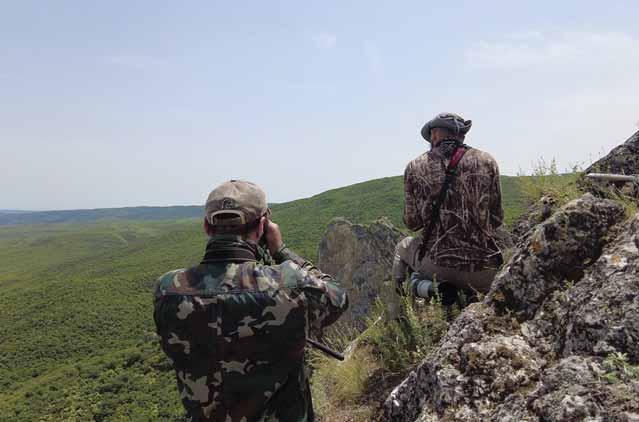
An estimated 99% of India’s vultures have been lost since 1980, the sharpest
decline of any animal known to man. In the early 1980s, there were an estimated 40 million vultures. Now their numbers are in the thousands. This dramatic loss was caused by the use of a veterinary anti-inflammatory drug on livestock that to vultures is highly toxic, and which, even in small quantities, is fatal. Indian vulture specialist Sonika Kushwaha offers commentary on the status of vultures in her country, as well as their role in mythology and culture. The loss of vultures means animal carcasses are left to rot, causing a chain of various negative effects, such as contaminated water sources, as well as leading populations of feral dogs to boom.
GEORGIA TODAY spoke to Saxon Bosworth, the man behind the documentary film “Vanishing Sky Lords.”
“This film means a lot to me,” he tells us. “It brought me on a thrilling journey of discovery. It was shocking for me to learn about the dramatic loss of vultures in India, because the scale was so drastic, and also because it was something I was unaware of until beginning work on Vanishing Sky Lords.
“As discussed in the film, this species held a grand role across various ancient cultures, associated with purification and rebirth, which is the case to this day in the case of communities of the Tibetan plateau who practice ‘sky burial.’ However, as Georgian artist and zoologist Luka Tkemaladze, comments in the film, they have been unfortunate with how certain media and stories have represented them. Furthermore, as the species prey on dead animals, they have certain
GEORGIA TODAY MARCH 3 - 9, 2023 9 SOCIETY
THE LEGEND OF PASKUNJI (ფასკუნჯი)
Paskunji is a mythical-fairytale bird from the stories of Kartvelian (pre-Christian Georgian) mythology.
The creature is described to have the body of a lion; yet with the beak, wings, and claws of an eagle. It moves between the underworld and the afterlife. The creature was said to be intelligent, thoughtful, sometimes even talkative. Lexo Gavashelishvili, Professor at Ilia State University tells a common narrative of a story of Paskunji from mythical Kartvelian folklore in “Vanishing Sky Lords”.
Artwork by Luka Tkemaladze (of local NGO, Nature Conservation Georgia).
Continued from page 1
EU, Denmark and UNDP Assist GEOSTAT to Introduce New Services for Municipal Data Collection
Credible and transparent municipal data is critical as Georgia strives to improve the quality of rural life and promote the balanced territorial development of its regions.
Diverse statistical information from municipalities will inform targeted development programs and will help assess the efficiency of local services and the achievements and gaps in local and regional governance.
The European Union and Denmark, in partnership with the United Nations Development Program (UNDP), are assisting the National Statistics Office, GEOSTAT, to improve municipal data collection, systematize already available statistical information, define and collect new statistical indicators, and make the sub-national statistics easily accessible to the public.
The results of this support were presented to the public on February 13, with
representatives from the Georgian Government, municipal authorities, civil society and the private sector attending the event.
“The EU cares deeply about further developing the regions of Georgia to make sure that the whole population has access to opportunities and services.
The foundation of this is clear and reliable data. The new GEOSTAT platform will help policy-makers and local authorities to make well-informed decisions for the people living in their regions. We are happy to celebrate its launch today,” said Colombe de Mercey, Governance and Human Capital Team Leader at the Delegation of the European Union to Georgia.
“Municipalities need reliable and transparent statistical data to assess their needs and develop responsive policies and programs. Denmark helps improve municipal data collection as part of our broader support for decentralization and
Gala Event in Zugdidi Showcases Handicrafts
good governance in Georgia,” said H.E. Anne Toft Sørensen, Ambassador of the Kingdom of Denmark in Georgia.
With the EU and Denmark’s support, GEOSTAT developed a specialized webpage regions.geostat.ge integrated into
its public website. The digital service offers information on 64 Georgian municipalities, tracking economic, demographic and social dynamics across 82 indicators, with 52 indicators provided by Georgia’s public agencies and the rest
by GEOSTAT through statistical surveys.
"The Regional and Municipal Statistics Portal will be available to all categories of users, enabling quick and easy access to statistical information, both at the regional and municipal levels," said Gogita Todradze, Executive Director of Geostat.
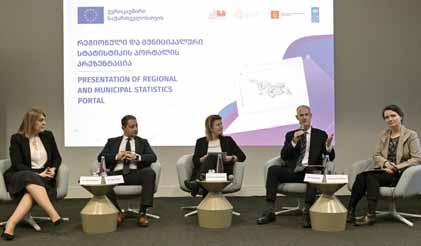
“UNDP welcomes cooperation with the EU and Denmark to support GEOSTAT in its vital work, respond to the national data needs, and assist Georgia to achieve its sustainable development priorities,” noted Nick Beresford, UNDP Resident Representative in Georgia. UNDP’s assistance to Georgia’s National Statistics Office, GEOSTAT, is supported by the EU-funded program EU for Integrated Territorial Development (EU4ITD) promoting balanced territorial development and improved living standards in Georgia’s regions, and the Denmark-funded project for decentralization and good governance in Georgia.
Monastic: Nekresi, Kakheti

by 40 women Supported by the EU and UNDP
Made
It’s been a couple of weeks since Lali and I visited her nephew, Luka, in his monastery, emerging from a light snow. He has been there for a few years now, having transferred from another famous and picturesque one, Gremi, in the same province. At nearly 30, he is still the youngest inhabitant of this ancient place.
Nekresi has parts from the 6th, 8-9th and 12th centuries, so it is quite old, and has been nicely restored. It suffered defacement of its magnificent frescoes when the last masters of Georgia, the Russians and then the atheist Soviets, took over. Its other features include a well-equipped winery, a cistern and an ossuary. Lali and her sister were not allowed into the residential section of the monastery, but I was, and I briefly met a few of the other monks, who live quite a simple life of single and corporate prayer, contemplation, and the running of the monastery and its churches. They make and sell their own Kidzmarauli red wine and beeswax candles, all of which were gifts for us, to help support themselves.
Nekresi is situated quite high above the flatlands of Kakheti, a steep winding switchbacked road (nicely re-cobbled in Saakashvili’s frenetic time) taking you up to its fastness. The views of the valley spread out below are far and wide.
The women-led non-governmental organization 'Hands for Peace' hosted a gala exhibition in Zugdidi to present the results of a 'Handicraft for Social Change' project, supported by the European Union (EU) and the United Nations Development Program (UNDP) through the EU4Dialogue initiative.
The EU and UNDP support allowed 40 conflict-affected women to join a training program in tailoring, embroidery, knitting and macramé to develop professional careers, earn a living, improve livelihoods and increase selfreliance. Six training participants already found jobs in different local enterprises and one of the beneficiaries was successful in applying for a grant program.
“In partnership with the European Union and civil society organizations, we help conflict-affected women to become successful in business and professional careers. Better access to educational and economic opportunities empowers women and benefits the entire community,” said Mariam Begiashvili, EU4Dialogue Project Officer.
The gala event opened with a runway show, with the project beneficiaries and their children presenting clothes and
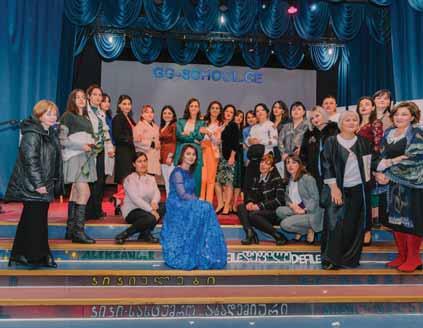
accessories created during the training. Guests also visited a craft fair where project participants displayed their needlework, including various garments and knitted toys.
In addition to handicraft training, ‘Hands for Peace’ helped women to master marketing, sales and social media, as well as learn how to write business proposals and apply for grants.
Aiming to build social cohesion in a conflict-affected society, the project brought together internally displaced people and their host communities. Out of 40 training participants, 15 were displaced from the Abkhazia region, and 25 were the residents of the Khobi, Tsalenjikha and Zugdidi municipalities.
# # #
EU4Dialogue: Support to Conflict Transformation in the South Caucasus and the Republic of Moldova is a joint initiative of the EU and UNDP under the broader EU4Dialogue program. The project partners with local civil society organizations and grassroots groups to improve socio-economic conditions for people, build livelihoods, drive progress toward gender equality, promote youth engagement and support the peaceful transformation of conflict. More information on the website: https://bit. ly/3BIreEv
They include the ruins of a huge Zoroastrian temple in someone’s vineyard, the walls practically down to ground level and the layout a nice diagonal square against the horizontals and verticals of one’s position.
We stayed for an hour or so, to catch up with our nephew, who was fifteen and a good singer at our wedding; he retains the latter characteristic, joining his fine voice with those of the other men. He showed us around the whole
facility, and knew well its history and details. He rarely leaves the place, and all they have between them is a single cellphone for contact, but at least we can call him by this and visit him when we want to. His parents and sister also can do this. The last time we saw him outside was at Lali’s parents’ home in Leliani, not far away, when her father, his grandfather, died a few years ago. He also spent some time in our house in Svaneti, notably keeping Lali company for a month when I spent one of my English teaching job’s free Christmas tickets to see family and friends in Canada. This was well before his monastic calling, and by the end of it, he was ready to flee the snowed-in isolation of the place.
Luka seems quite content now where he is, and I expect him to grow into it and stay for life. It means that (like me and his uncle, Lali’s brother) his father’s male line will end with him. But there are compensations. His faith seems solid, and there are few of the frantic distrac-
tions of the 21st century’s busy, disinformed and confusing life to sap its strength. In some ways there is much to appreciate and even envy here, although I think that one must indeed feel a definite calling to it, as you are also renouncing much. (A chapter of Mother Teresa’s nuns once, under threat of invasion from some African revolution, called the Mother House in Calcutta for advice. “Die well,” they were told). We said our fond farewells and drove back down, each silently thinking of the young man, what he has given up and gained.
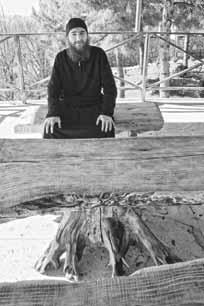
Tony Hanmer has lived in Georgia since 1999, in Svaneti since 2007, and been a weekly writer and photographer for GT since early 2011. He runs the “Svaneti Renaissance” Facebook group, now with nearly 2000 members, at www.facebook.com/ groups/SvanetiRenaissance/
He and his wife also run their own guest house in Etseri: www.facebook.com/hanmer.house.svaneti
GEORGIA TODAY MARCH 3 9, 2023 10 SOCIETY
BLOG BY TONY HANMER
Berikoaba – Georgia’s Ancient Fertility Festival Still Going Strong
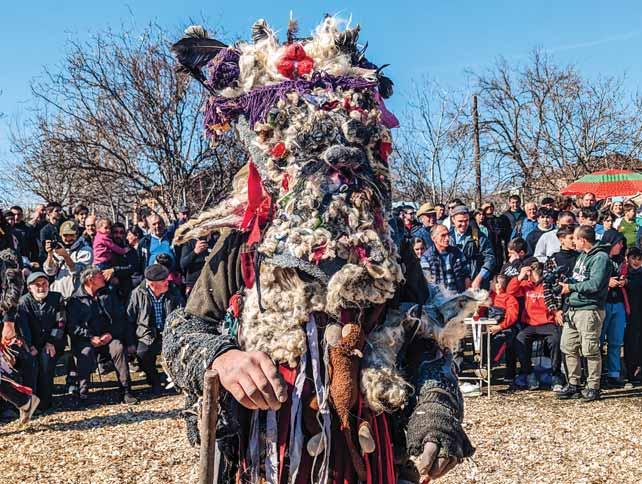
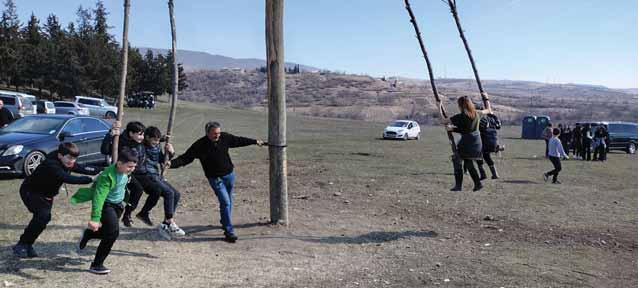
field, where a saw-dust strewn circle had been prepared, with benches around it, for the soon-to-ensue wrestling event. Boys, teens, and men of various age and girth were roughly matched according to weight, to battle it out to the accompaniment of traditional Georgian instruments, until one of the pair was thrown to the ground, the champion making way for the next two fighters. Across from the game area, a bare tree-trunk had been stood upright, a horizontal wooden beam placed atop it, at each end of which a swing of rope and wood hung. For the following three hours, the two seats were never empty – delighting children and adults alike.
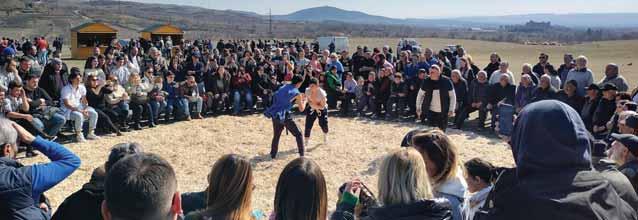 BY KATIE RUTH DAVIES AND BAIA DZAGNIDZE
BY KATIE RUTH DAVIES AND BAIA DZAGNIDZE
Two GEORGIA TODAY editors – former and current - got together last weekend to pay respects to an ancient Georgian festival and to recharge our batteries in the sunny Kakhetian countryside. Our trip by minibus, alongside other local and nonnative tourists, took around an hour out of Tbilisi. Didi Chailuri is a typical Georgian village, one that grew along the slope of a rolling hill near Sagarejo, centered around a small church and stretching down into the valley and toward the ruins of a castle beside the highway. And it was from that small church that the Berikaoba madness began when, after a brief moment to pray, around 10 young men leapt out into the road, dressed in the best and most colorful examples of upcycling I’ve yet to see in Georgia- old clothing cut into strips and sewn onto multiple layers of trousers, jeans and jumpers; masks made of old carpet, pillow covers and t-shirts, all adorned with feathers, sheep hide, and pumpkin seeds. Their aim: To scare and delight us. In their hands they carried rope whips, which they smacked into the dry earth of the lane to keep us back as they danced down the street, jumping noisily and energetically into puddles, splashing us and smearing mud on our faces and hands at any cheeky move we made beyond the space set for us. By space, I mean at the back of the frolicking group, with the other
journalists and tourists, giving space for the Berikas to do their high-spirited work for the village families: Pouncing, chattering in high-pitched voices, into peoples’ yards, jumping and growling and smearing them with mud, only leaving when appeased by traditional gifts of churchkhela, wine, cheese, eggs or bread. Modernity crept in with stops to pose for a selfie with a Berika, or for the journalists to record a special moment of playfulness.
Berikaoba is a traditional public holiday that originated in pagan Georgia. Unfortunately, Georgian history books have very little information about the tradition, or precisely when it started, and some suppose it is over 2000 years old. Initially, it was a fertility ritual and the Berika costumes incorporated hanging phallic forms. However, the theme, costumes, customs, and procession have changed over time, today being much more playful and family-friendly.
“In the modern day, Berikaoba became an agricultural holiday connected with and celebrating the arrival of spring. In Didi Chailuri, Berikaoba is held on the last day of the Cheesefare Week," says Eka Chikadze-Veshapidze, a resident of Didi Chailuri, history teacher, and the main organizer of Berikaoba. She notes that, back in the day, it was celebrated all over the country, yet only around five villages keep the tradition today.
“The reason we keep Berikaoba alive in Didi Chailuri is probably our attachment to the Georgian identity. I’m a historian by profession, and I value the history and the path Georgians have taken to get where we are today. I want the next generation to walk firmly in the
footsteps of their ancestors," Eka explains, adding that she feels responsible for maintaining this non-material cultural heritage.
And alive it was, as, sneaking ahead of the Berikas, we entered the village sports
The guests were also treated to free local wine, cheese, nuts, grapes and a special local version of Kada (a more savory version than that served in Tbilisi), which Eka had pre-made the dough for. Guests were able to form the Kada and place their rounds into traditional clay dishes (ketsi) to cook next to the hot embers. A few meters away, another pile of embers was used to barbecue locally-sourced meat. Guests could also
the wrestling field, so I decided to do something to support them," Eka tells us. One idea she had was to introduce a gastronomy festival element, and with her students set up stands and tables for guests to try red and white local wine, bake Kada, and make Churchkhela.
One of her assistants this year is her student Lekso Malasidze. As Eka describes him, Lekso is hugely in love with his village, and without him, she wouldn't have been able to accomplish so much. She also gets help from her former and current students and the eco-club she runs, who took it upon themselves to clear up after this year’s event.
PUBLISHER & GM
George Sharashidze
COMMERCIAL DEPARTMENT
Commercial Director: Iva Merabishvili
Marketing Manager: Natalia Chikvaidze
EDITORIAL DEPARTMENT:
Editor-In-Chief: Katie Ruth Davies
Journalists: Ana Dumbadze, Vazha Tavberidze, Tony Hanmer, Emil Avdaliani, Nugzar B. Ruhadze, Michael Godwin, Ketevan Skhirtladze, Mariam Mtivlishvili, Erekle Poladishvili
Photographer: Aleksei Serov
have a go at making Churckhela (Georgian snickers) in a huge metal pot – the nuts were already threaded, and all guests had to do was dip them into the thick grape juice (Tatara), which had to be constantly stirred by alternating villagers to prevent it from sticking to the bottom of the pot and burning.
Whatever is happening in the outside world, Didi Chailuri always organizes the annual Berikaoba festival. Originally, it only involved the local community, and because of this, over time, the participants' motivation began to decrease.
“I saw how sad Berikas would leave
Website Manager/Editor: Katie Ruth Davies
Layout: Misha Mchedlishvili
Webmaster: Sergey Gevenov
Circulation Managers: David Kerdikashvili, David Djandjgava
The festival doesn't get any funding, and, as Eka explains, donations from the residents cover the expenses. For example, the municipal residents this year pulled together to buy a sheep as an award for the winning wrestler. On Sunday, with double the number of tourists and journalists than last year, they were able to collect more in donations than usual, which will be put back into next year’s event. Among the ideas Eka has looking ahead are to invite Kakhetian craftspeople to display and sell their works.
"And, after seeing this much interest, we’re thinking of recreating historical stories, in which the money collected by donations this year will help us to sew better masks for next year,” she says.
At the peak of the festival, Eka was awarded a Diploma of Honorary Citizen by the grateful residents of Didi Chailuri for the services and exceptional contribution she is making to her village. That gratitude was clearly seen also in the shining eyes of the people who attended, leaving sun-kissed and proud to have been a part of such a positive and community-driven Georgian tradition.
ADDRESS 1 Melikishvili Str.
Tbilisi, 0179, Georgia
Tel.: +995 32 229 59 19
E: info@georgiatoday.ge
F: GeorgiaToday
ADVERTISING & SUBSCRIPTION
+995 555 00 14 46
E-mail: marketing@georgiatoday.ge
Reproducing material, photos and advertisements without prior editorial permission is strictly forbidden. The author is responsible for all material. Rights of authors are preserved. The newspaper is registered in Mtatsminda district court.
Reg. # 06/4-309
GEORGIA TODAY MARCH 3 - 9, 2023 11
GEORGIA TODAY
CULTURE
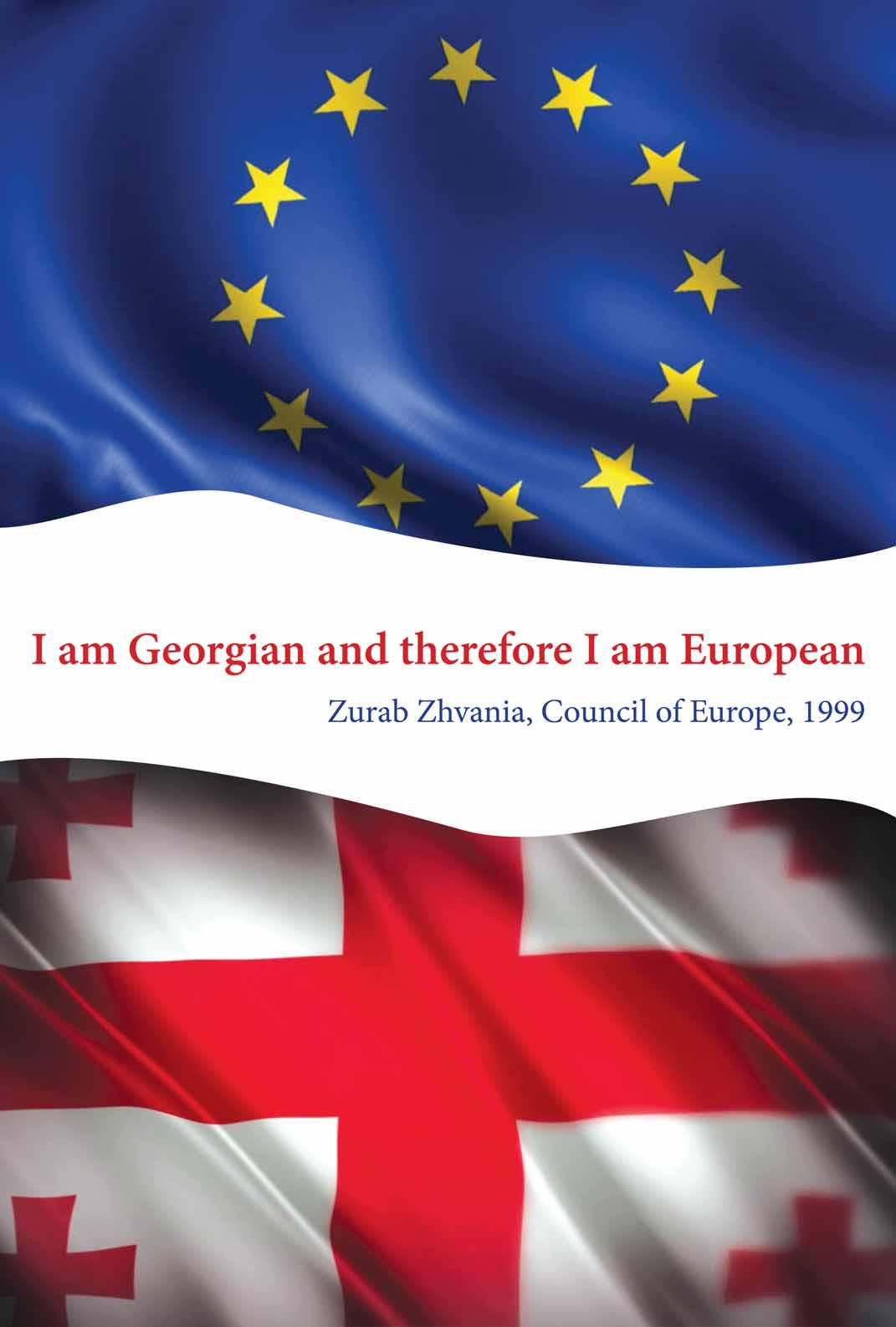






























 BY KATIE RUTH DAVIES AND BAIA DZAGNIDZE
BY KATIE RUTH DAVIES AND BAIA DZAGNIDZE
